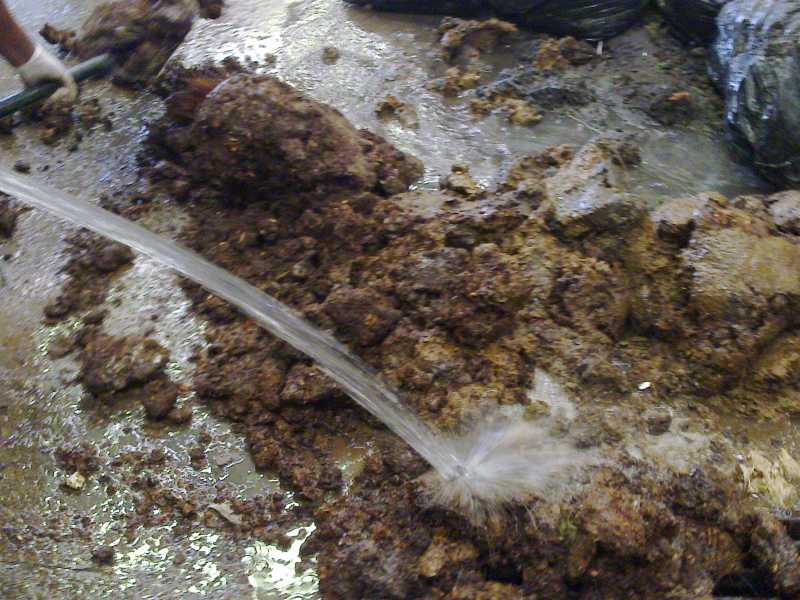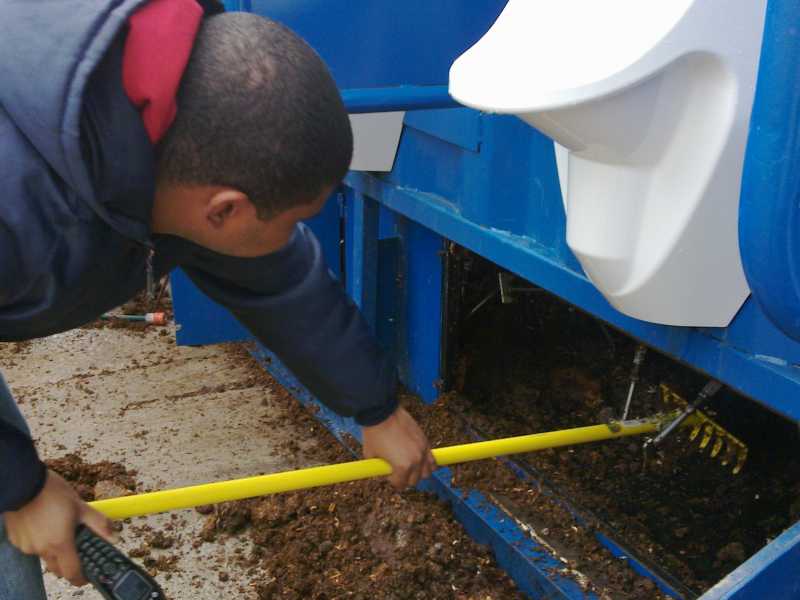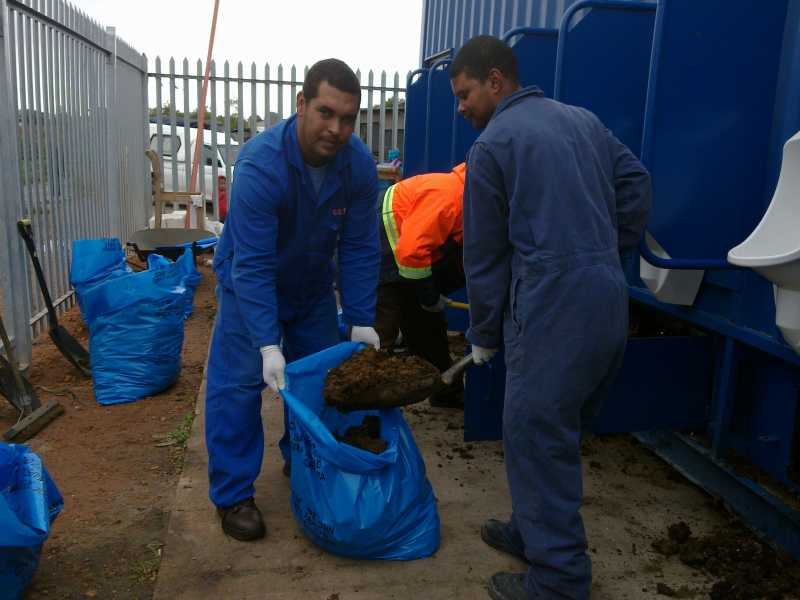- Forum
- categories
- Sanitation systems
- Shared toilets, community toilets, public toilets
- Management of faecal sludge from the MobiSan
Management of faecal sludge from the MobiSan
8029 views
- muandac
-
Topic AuthorLess
- Posts: 12
- Likes received: 1
- Increasing the drying period to 9 months may be enhance the drying process
- Increasing the drying agent (saw dust) dosage in the vaults used by children and female and at the nightsoil disposal may be tested as well.
- Provide additional aeration (from the bottom of the vault) and by not allowing faecal sludge to be in direct contact with the vault floor will increase the drying process.
These issues should be explored in order to ensure that the FS is dry, safe for handling and reuse or disposal.
Chris
Researcher & Lecturer
Centre for Water and Sanitation Research
Cape Peninsula University of Technology
Cape Town, South Africa
Telephone: +27219596813
email: This email address is being protected from spambots. You need JavaScript enabled to view it.
Please Log in to join the conversation.
You need to login to reply- Elisabeth
-
- User is blocked
- Freelance consultant since 2012
Less- Posts: 3372
- Karma: 54
- Likes received: 932
Re: Management of faecal sludge from the MobiSan
+++++++++++++++++
Dear Elisabeth,
Nice to hear from you and also that the Mobisan system is still working. The pictures of the (more or less) dried faecal sludge are very interesting and on the one side indicate the potential while indeed practically further improvements for drying & collection are required. During the development phase, we were not aiming for reuse, but for disposal in a wastewater treatment system. As for reuse, I think thorough attention for disinfection and removal of helminth eggs is imperative. Overall, I think the system is a big success with respect to user satisfaction & sustainability but sludge disposal (or reuse) aspects need further development.
And yes, David and myself have been heavily involved. David’s MSc work (which I supervised) was dedicated on finding options for sanitation in Cape Town’s informal settlements which lead to the idea. We engaged with Landustrie and through financing of Partners for Water we jointly realized this project. Together with Cape Town Water Services we put a lot of afford to have a good operation & maintenance arrangement and I think this has been one of the key factors for success (along with the good design and construction by Landustrie).
Personally I believe that the system has big potential, given the circumstances in Cape Town.
Best regards
Adriaan
Vitens Evides International
The Netherlands
+++++++++++++++
The MSc thesis which he mentioned by David Castellano is available here in the SuSanA library:
Castellano Fabrega, D. (2007). Decision support tool for the appropriate selection of sanitation systems. MSc Thesis, Urban and Environmental Management, Wageningen University, Wageningen, The Netherlands.
www.susana.org/lang-en/library?view=ccbktypeitem&type=2&id=1642
The thesis is from 5 years ago and still valid - a good example that one has to be patient when it comes to sanitation implementation....!
++++++++++
Christophe Muanda wrote afterwards:
Dear Brendo
The MobiSan is considered to date as one of the innovative communal mobile dry sanitation technology of its kind. This concept is being investigated to ascertain its applicability in a broad context of informal settlements where access to water and sewer is not apparent.
Our role as researcher was to investigate various aspects of the technology including user perception, functionong, faecal sludge management and sustainability. This was done simply because of the potential the technology has shown and huge interest by various service provider. Our intention is to provide advices to those interested and looking forward how the technology can be replicated.
So, we are not promoting the technology but looking at its potential.
Regards
Christophe Muanda
Researcher/Lecturer
Freelance consultant on environmental and climate projects
Please Log in to join the conversation.
You need to login to reply- muandac
-
Topic AuthorLess
- Posts: 12
- Likes received: 1
A researcher at CWSR based at Cape Peninsula University of Technology
My research focus is water and sanitation in peri-urban and informal settlements; also interested in sanitation technology innovation targeting rural and urban informal settlements.
An ongoing research by the CWSR entitled" Management of faecal sludge from the MobiSan)" aimed at assessing the current management practices with the view to develop/suggest an environmentally faecal sludge management option for consideration.
According to the MobiSan designers, the main intention was to collect and discard faecal sludge and urine at a nearby treatment work. However, given the nature of faecal sludge produced, the disposal at treatment works was found impossible as the faecal sludge was not accepted for various reasons.
The contractors decided to apply number of management practices that were found to be misaligned with the good practices. Disposing faecal sludge into sewer, stormwater drain, transportation to a landfill site etc, were all found inadequate and expensive, hence alternative options needed.
The research team is currently looking at various options and selct a some for considerations, and to some extent piloting. Findings will be discussed in coming months.
What is in your view a sustainable way for managing faecal sludge in an informal settlement context?
Chris Muanda
+++++++++++++++
Link to my paper on this topic at the recent FSM-2 Conference in Durban:
www.susana.org/lang-en/library?view=ccbktypeitem&type=2&id=1624
Link to my presentation:
www.susana.org/lang-en/conference-and-tr...conferences/781-fsm2
(find the presentation in Session B4 at, or use this direct link:
www.susana.org/images/documents/07-cap-d...ity-south-africa.pdf)
Researcher & Lecturer
Centre for Water and Sanitation Research
Cape Peninsula University of Technology
Cape Town, South Africa
Telephone: +27219596813
email: This email address is being protected from spambots. You need JavaScript enabled to view it.
Attachments:
-
 06052007486.jpg
(Filesize: 70KB)
06052007486.jpg
(Filesize: 70KB)
-
 05052007444.jpg
(Filesize: 39KB)
05052007444.jpg
(Filesize: 39KB)
-
 06052007486.jpg
(Filesize: 70KB)
06052007486.jpg
(Filesize: 70KB)
-
 05052007454.jpg
(Filesize: 41KB)
05052007454.jpg
(Filesize: 41KB)
Please Log in to join the conversation.
You need to login to reply- Forum
- categories
- Sanitation systems
- Shared toilets, community toilets, public toilets
- Management of faecal sludge from the MobiSan







